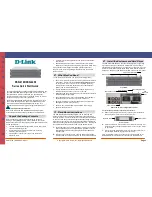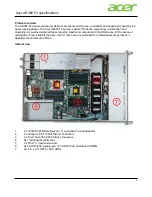
Intel® Server Board S2600CW Platform Management
Intel® Server Board S2600CW Family TPS
64
Revision 2.4
State
Supported
Description
S3
No
Supported only on Workstation platforms. See appropriate Platform Specific Information
for more information.
S4
No
Not supported.
S5
Yes
Soft off.
The front panel buttons are not locked.
The fans are stopped.
The power-up process goes through the normal boot process.
The power, reset, front panel NMI, and ID buttons are unlocked.
5.2.3
System Initialization
During system initialization, both the BIOS and the BMC initialize the following items.
5.2.3.1
Processor Tcontrol Setting
Processors used with this chipset implement a feature called Tcontrol, which provides a
processor-specific value that can be used to adjust the fan-control behavior to achieve
optimum cooling and acoustics. The BMC reads these from the CPU through PECI Proxy
mechanism provided by Manageability Engine (ME). The BMC uses these values as part of the
fan-speed-control algorithm.
5.2.3.2
Fault Resilient Booting (FRB)
Fault resilient booting (FRB) is a set of BIOS and BMC algorithms and hardware support that
allow a multiprocessor system to boot even if the bootstrap processor (BSP) fails. Only FRB2 is
supported using watchdog timer commands.
FRB2 refers to the FRB algorithm that detects system failures during POST. The BIOS uses the
BMC watchdog timer to back up its operation during POST. The BIOS configures the watchdog
timer to indicate that the BIOS is using the timer for the FRB2 phase of the boot operation.
After the BIOS has identified and saved the BSP information, it sets the FRB2 timer use bit and
loads the watchdog timer with the new timeout interval.
If the watchdog timer expires while the watchdog use bit is set to FRB2, the BMC (if so
configured) logs a watchdog expiration event showing the FRB2 timeout in the event data
bytes. The BMC then hard resets the system, assuming the BIOS-selected reset as the
watchdog timeout action.
The BIOS is responsible for disabling the FRB2 timeout before initiating the option ROM scan
and before displaying a request for a boot password. If the processor fails and causes an FRB2
timeout, the BMC resets the system.
The BIOS gets the watchdog expiration status from the BMC. If the status shows an expired
FRB2 timer, the BIOS enters the failure in the system event log (SEL). In the OEM bytes entry in
















































